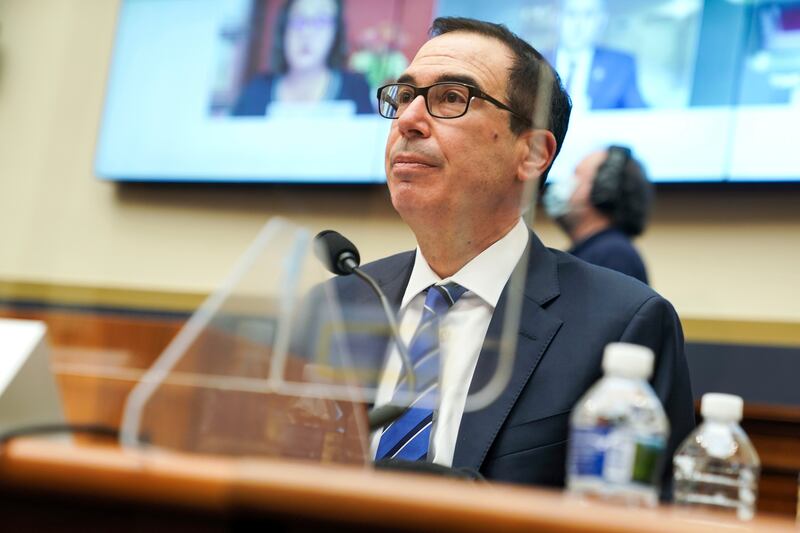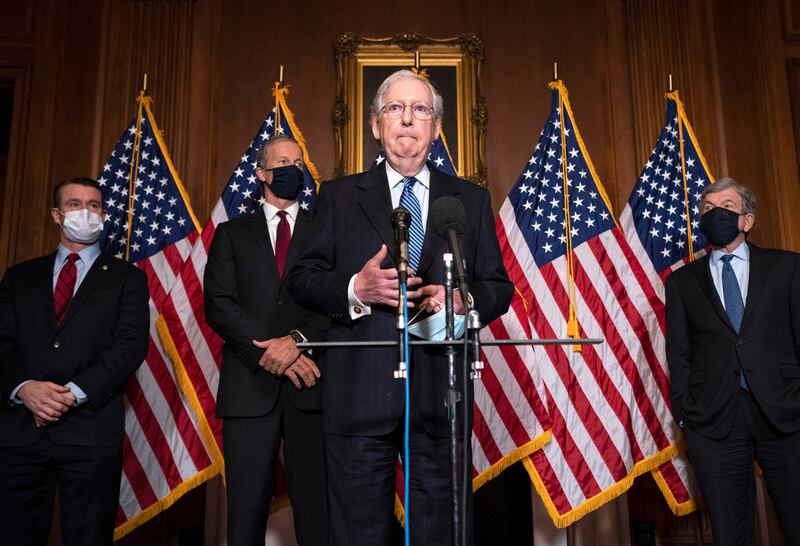As the holiday recess looms close, congressional leaders and the White House continued Wednesday to debate the terms of what would likely be the last coronavirus stimulus package of the Trump administration.
Lawmakers insist they’ll find compromise before leaving Washington Dec. 21 for the holidays.
White House negotiator Treasury Secretary Steven Mnuchin offered Democrats a $916 billion package that would include a second round of individual stimulus checks, The Associates Press reported.
Tuesday’s nearly trillion dollar offer, which is $8 billion higher than last week’s bipartisan proposal, also includes liability protection for businesses operating during the pandemic and funding for state and local governments, according to Politico.
What the White House offer lacks, and could be a deal breaker for some lawmakers, is a $300 weekly federal unemployment benefit that was included in the bipartisan proposal, according to the AP.
Referring to the $908 billion bipartisan proposal Tuesday, Senate Majority Leader Mitch McConnell, R-Ky., said liability protections and state and local aid could be dropped and renegotiated next year, Politico reported. The article said Senate Minority Leader Chuck Schumer, D-N.Y., accused McConnell of “sabotaging” negotiations,

Here’s what Congress and the Trump administration are negotiating:
More stimulus checks
Mnuchin’s offer to lawmakers includes funding for $600 individual stimulus checks to Americans.
That’s half the amount provided in March’s Coronavirus Aid, Relief, and Economic Security Act, which included $1,200 checks, but is more than last week’s bipartisan proposal, which lacked individual payments.
President Donald Trump and lawmakers on both sides of the political divide — like Republican Sen. Josh Hawley of Missouri and Vermont Independent Sen. Bernie Sanders — wanted any new coronavirus stimulus package to include individual checks, Politico reported.
Federal unemployment assistance
While Mnuchin’s offer includes language and some funding for unemployment aid, House Speaker Nancy Pelosi, D-Calif, and Schumer both said an aid cut from $180 billion to $40 billion was “unacceptable,” The New York Times reported.
The White House offer also wouldn’t extended the $300 weekly federal unemployment benefit.
The bipartisan proposal “would extend unemployment insurance programs that are set to expire at the end of the month for 16 weeks, and provide a $300 per week federal boost to benefits from the end of December into April,” according to The Hill.
Business liability protections and other government aid
Liability protections for businesses open during the pandemic had been a “red line” issue for McConnell, who previously fought for the language, Politico reported, but the majority leader suggested Tuesday that talks around the issue could begin again next year if it meant passing a new package before the holiday recess.
Leaders from both parties have said that they wouldn’t leave for the holiday recess — scheduled to begin Dec. 21 — until a deal was reached.
State and local government aid is included in both the bipartisan proposal and the White House offer.
According to a summary of the bipartisan proposal obtained by The Hill, liability protections and $160 billion for state and local governments are included. The summary said legislators agreed on the principles of both issues “as the basis for good faith negotiations.”
The Hill’s copy of the proposal summary also includes:
- A second round of Payroll Protection Program loans for businesses that “have 300 or fewer employees and had revenue loss of 30% in any quarter in 2020,” allows local chambers of commerce to apply for PPP, adds business expenses that can be forgiven under the loan and sets aside loans for the “smallest businesses and businesses in underserved communities.”
- Eviction moratoriums though January 2021.
- $25 billion in rental assistance to state, local and tribal governments.
- Student loan forbearance though April 2021.
- Funding for health care and education workers.
- Money for vaccine development, testing and tracing.
- Funds for food assistance.


